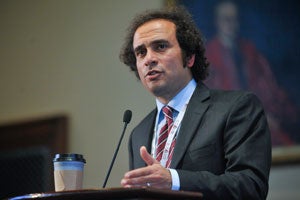The revolutionary uprising known as the Arab Spring is now nearly two years old, and both the status and the future of the democratic movement that it fostered in the Middle East and Northern Africa are the subject of intense debate.
Over the course of four days between Nov. 8 and 11, at the sixth annual Harvard Arab Weekend, Arab leaders from government, business, academia, and the professions gathered at Harvard Law School and Harvard Business School to assess the impact of these changes and what may lay ahead. The event, “The Arab Up-rising: Sustaining the Spring—Avoiding the Fall,” was sponsored by the Harvard Arab Alumni Association and various Arab student organizations on campus.
The event featured panels that examined the revolution from a variety of perspectives, including analyses of its impact on education, health care, media, private enterprise, and individual freedoms.
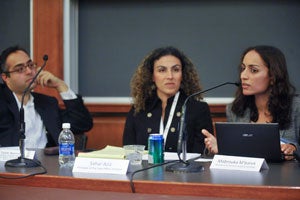
Individual speakers included Fadi Majdalani, a senior partner at the international consulting firm Booz & Co., who gave an overview of the challenges that government and business leaders are facing and the choices they are considering.
He characterized the region as one with surprisingly robust economic growth, in part as a result of economic reforms that pre-dated the Arab Spring, but beset by “tensions that need to be addressed.”
For example, he said, leaders face tension between stability vs. openness—the idea that too much openness could be dangerous to the social order. Another, he said, is the tension between more traditional “appeasement” in the form of subsidies to groups and the creation of government jobs vs. “transformation” in the form of targeted skills training and public-private partnerships.
“If governments are serious about maintaining economic growth,” he said, “then they must continue the reforms they launched prior to the Arab Spring.”
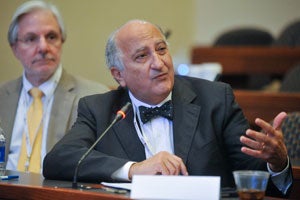
While government and business leaders are pondering future economic courses, other groups are trying to come up with plans to govern how entire societies might operate as open democracies. The revolution has led to efforts to create new constitutions in several countries, and one panel focused on the ongoing efforts in two of them: Egypt and Tunisia.
Sahar F. Aziz, as associate professor of law at Texas Wesleyan University, who has been monitoring the process in Egypt, said that the constitution-drafting procedure in that country has been the subject of intense public debate.
“It is a really big accomplishment that this is a collaborative process,” she said. “If there’s one thing we can say about Egyptians right now, it’s that they’re all immersed in fighting each other, arguing with each other, debating each other; nobody is conceding anything. In some ways, it’s very frustrating, but I think if you look at the apathy and the complacency and the fatalism that existed before the revolution, I think that’s a significant accomplishment.”
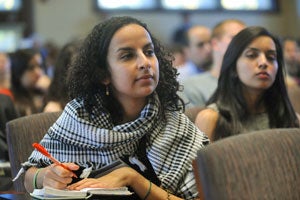
A 100-member committee is working on the draft document, a task which it hopes to conclude by year’s end, and Aziz said that the effort is in large part a battle for legitimacy among Muslim and non-Muslim groups. She characterized the large and influential Muslim Brotherhood as being caught in the middle between liberal forces on one side and the conservative Salafists on the other, and that the outcome of the Brotherhood’s reaction to these influences may have a large bearing on the constitutional outcome.
“So the Brotherhood is either going to do what the Republican Party did in America and be forced by the Tea Party to shift to the right and make the moderates look like they’re out of touch or what the Brotherhood might do is try to marginalize the Salafists and say, ‘Those people are nuts and we are the moderates.’ And so then they’ll go to the liberals and say, ‘See? You want to work with us and not with those nutcases,’ and they might actually moderate their message.’ This is a new position for the Brotherhood. They used to be outsiders, the opposition.”
She said that, to date, there have been numerous victories for liberal groups in the drafting process, including the removal of language about the ruling power of Sharia law, and a statement that sovereignty belongs to the people and not to God.
Another panelist, Mabrouka M’Barek, is a member of Tunisian Constituent Assembly, which was elected on Oct. 23, 2011, to create the document that will lay out the principles under which the democratic nation of Tunisia intends to be governed.
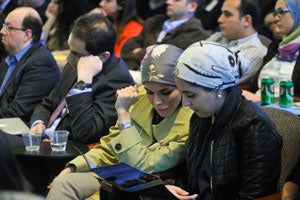
“The constitution is about writing a new social order,” she said. “It’s like riding in a car and everyone is pulling at the steering wheel, pulling right and pulling left, and we have to find the right direction we want to take. We have to find the right balance.”
While the prospect of citizens sitting down to draft democratic constitutions sounds promising, the Nov. 10 keynote speaker, Amr Hamzawy, a political science professor at American University in Cairo and Cairo University, provided a pessimistic view of the situation in Egypt.
Hamzawy, a former member of the Egyptian Parliament, hailed two outcomes of the revolution—the fact that Egypt today has an elected civilian president and that the military has been largely “pushed out” of Egyptian politics—as significant achievements. But he is skeptical that much else will be achieved and cited several reasons for his doubts.
Egypt has a “corrupt state bureaucracy which has yet to abide by democratic regulations and norms,” he said. “Systematic human-rights violations and systematic restrictions on personal freedoms continue to shape Egypt’s reality.” And, “social and economic protest activities in Egypt continue to be dealt with as activities which need to be banned and outlawed once again.”
Hamzawy said that citizen demands for democracy in Egypt and elsewhere in the region have become “mis-shaped” since early 2011 due to the influence of conservative and radical Muslim forces.
“We began putting forward a clear demand for human rights, personal freedoms and transparent accountable governments,” he said. “But in Syria today, you cannot distinguish them from the demands and agendas that are ethnic-based and sectarian-based. You cannot distinguish them, in Tunisia and Egypt, from demands which are being put forward from radical conservative movements that are trying to impose a conservative morality on society and trying to impose a conservative understanding of what a modern society is all about.”
